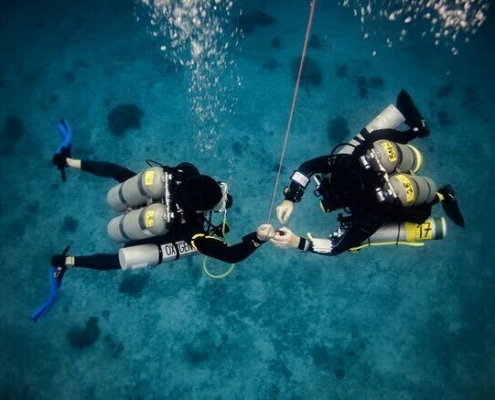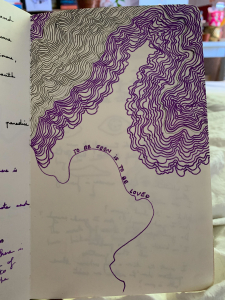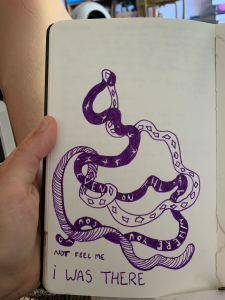🌊 Taking care of your mindsoulheartbody after a retreat 🌺
Aka help, I was just in meditative/community bliss for a week and my heart chakra got big as a tree and now I’m on a street in Brooklyn and my mom just yelled at me on the phone and I almost got run over by a bike
So you were in a retreat, a workshop, a community, an experience. Maybe your heart feels wide open. Maybe you’re now wrestling with many inner questions. Maybe not much has changed. Heightened experiences can be powerful and bring us new perspectives, new friends, new ambitions. What’s also interesting about them is that the transition back to our daily life can be tricky. It can be helpful to have a bit of a roadmap.
Indeed, besides all the delicious feelings of warm connection and hope that can stay with us long after we’re home, some of these may also show up:
- Feeling disconnected from your “normal” life, from loved ones and friends
- Feeling incredibly sensitive, as if your top layer of skin is gone/your usual protections aren’t there
- Feeling moments of big high that transition into big lows
- Feeling alone and abandoned, craving the community or group you just left
- Feeling ecstatic all the time
- Feeling physically ill
- Feeling an urge to convert everyone around you to what you’ve just experienced
- Feeling lost
- Feeling hopeless about the fate of the world
- Feeling dissociated, “up in the clouds” and ungrounded
- Not knowing how to integrate what you’ve learned and experienced into your daily life
- Despair when the special, pleasant feeling of the retreat starts to dissipate
Know you are not alone. These experiences are shared by many, many retreat participants. And it makes sense! A central notion in somatic therapy is the fact that expansion is usually followed by contraction: when we have an experience that opens and challenges us in a way we’re not used to, our system then contracts to try and find stability again. Most of the uncomfortable stuff in that list? Contraction. This is normal and natural, and if we let ourselves slowly and gently integrate the expansion, our everyday state can become a little more expanded than it was before. That’s how we progressively gain more and more capacity over time to be with life in all of its richness.
How do we integrate slowly and gently, you may ask?
First, let’s take a breath.
🌬️
Now let’s get some inspiration from the deep blue sea.
Decompression stops

Deep sea divers are just like you. They swim down to spend time in the depths, where they experience a magical, disorienting swirling of time and experience, and get to see things they could never find close to the surface.
Divers also know that coming back from the depths requires a process in order to return safely. Put your science hat on for a second: At great depths, the body of the diver quickly becomes saturated with nitrogen. When they start to ascend towards the surface, the pressure of the surrounding water decreases and the nitrogen accumulated during the dive returns to their blood in the form of microbubbles. If a diver swims up too quickly, the gas expands so fast that the body cannot eliminate it safely, and the diver develops decompression sickness. The consequences can be serious and even fatal. Therefore, divers make a series of decompression stops to allow their bodies to acclimate to the decreased pressure. At each decompression stop, the diver breathes normally, allowing the dissolved gas to be expressed.
You can see your own process coming out of a retreat as a journey of decompression stops.
The length and rhythm of this journey and the number of stops are entirely your own, and differ for each of us according to our needs. The more gentle and conscious the process is, the more likely it is you’ll be able to digest everything you experienced.
🌬️
Hey you. Let’s take another breath together. Nice.
🌬️
Here are some ideas of what this landing journey could look like.
Soft landings
The point of decompression stops is for you to experience a soft landing. The idea is to avoid an abrupt transition between retreat life and “real” life, to answer the following question: what would make this landing back into your life softer? Another major notion in trauma and somatic therapy is that our systems can default to speed and “moving on to the next thing” whenever we feel emotional stress. It’s a great skill to acquire to live change processes gently and moment by moment.
A key question you might want to ask yourself before reading further is: in my life so far, what has helped me deal with transitions? What helps me feel safe in the midst of change? Start there.
Examples of soft landings
As the experience is wrapping up
Endings are important. The end of retreats and group experiences can go by in a rush when emotions are high and we don’t want the experience to stop. Experiment with slowing the ending process down. What does that bring up?
On the journey home
If your retreat was residential, is someone in your group open to traveling back together part or all of the way?
Rather than rushing home, can you take a second to see what connections might come up along the way? It can feel surprisingly nourishing to talk to a cashier in the airport about the weather rather than rushing to sit at the gate. And if you’re feeling like you need 0 people time and to minimize contact, of course then that is the thing to follow.
Once you’re home/you’ve reached your next destination
What feels grounding when you’re home? Do you have a favorite meal? A neighbour you like to check in with? Your system will probably want to reconnect with a little familiarity. Let it. I promise you won’t lose all the newness you just got.
The next little while will probably involve reconnecting with the day to day while staying connected to the experience you just had. To support the latter, the following might help:
🌸Did you get close with someone in your group? Could you agree to daily brief check-ins for the next week or so?
🌸Does anyone in your group feel open to having weekly check-in Zoom meetings for a few weeks following the end of your retreat? Often many people are interested, because they need integration just like you!
🌸Does anyone in your group want to create a Whatsapp group or email chain?
If you’re going to stay in touch digitally with new friends and/or lovers, it can be very helpful to discuss how you each approach digital communication. We tend to have varying expectations and approaches to using our phones. Some of us like to feel very connected and use our phones as extensions of our every day communication-self. Others don’t love being on their phone, and don’t use it as a tool for deep or emotional communication. Whatever way you function is fine. Get the lay of the land and be clear about your personal approach so that your feelings don’t get unnecessarily hurt.
After a retreat I participated in recently, the other participants and I decided to share a list of the specific actions we wanted to integrate into our lives after the retreats. We made a document with the list and we agreed I would send the list to everyone again in 1 year exactly to see how we did.
Can you have regular moments of integration with one friend or therapist over the coming weeks? (If people are not your thing, a favorite nature spot, plant or animal works wonders too.) Make sure you allow yourself to set all the boundaries and requests you need around such a moment. If you need your friend to sit there and listen without giving feedback or commenting, make that clear. See if that works for them. Consistency and continuity can be very helpful here, so an idea can be to see if one friend feels open to being your appointed integration person for those few weeks.
A little recommendation: Exercise discernment about who you share your experience with. You may feel like telling everyone about the beauty you just experienced, you may feel like you now have answers to friends or family members’ problems, you may feel like you’re now ready to heal things with your complicated parent. It may well be the case! It may also be worth first really checking in with yourself and grounding your experience. Trust that whatever you learned and can share will not disappear as the weeks go on.
When we return from such an experience, we are often very open and a little fragile because of that openness. If we share with others who have not been in the same safe, heart-open space, we may have to deal with some intense responses we don’t have the capacity to handle…
Overall, as much as you can, let yourself go slowly and touch base with whatever and whoever in your life feels trustworthy, safe and resourcing.
🌬️
Take a second. Let’s breathe again. You’re doing great.
🌬️
Grounding and integration
A frustration that can come up after a retreat is not knowing how to translate everything you felt and learned into action or change in your life. Here again, slow down. It’s normal for this process to take time.
Anything that helps move your ideas, emotions and impressions into the physical realm can help:
🌱Take care of that mindsoulbody! Rest! Drink water! Rest more! Go on a walk! Roll around in the grass! Dance awkwardly! Eat kitchari or Nutella, depending on your deep need! Shake shake shake! Or lie there like a carp! Light candles! It’s all good. I know if I don’t do some gentle movement or walking after a retreat, I get all locked up. Emotional experiences are deep body experiences, and they can summon immense amounts of physical energy.
🌱Experiences that open us up can also make us lose our sense of where we end and begin, literally and physically. Give yourself containment: Hug yourself, asks for hugs and/or ask someone safe to lie on top of your back while you lie down on your belly (trust me try it), walk barefoot, wrap a tree branch around you.
🌱Journaling
Some examples of journaling prompts
- What are the three main things this experience has brought me?
- What parts of myself did this experience help me connect with? What emotions? What parts of my body? What might these parts want to tell me if I give them the space?
- What do I want more of in my life? What do I want less of?
- What actions do I want to take in my life to honor this experience?
Are there concrete projects that this experience has inspired me to launch into? What would I need to get those in motion?
🌱Drawing
Some examples of integration drawings below


(Having someone read your stuff or look at your art can feel extra grounding, if you are comfortable)
🌱Chop wood, carry water. Normal life stuff can be very grounding. Laundry, dishes, watering your plants, cooking, cleaning, taking care of the kids. Getting some space from intense experiences and letting your attention go elsewhere can be very helpful to integrate.
🌱Find simple practices in the everyday that connect you back to deep feelings, to grace. When I spent some time in Plum Village, a Buddhist community, a bell rang every hour or so. We were told very clearly that every time the bell rang, we were to stop what we were doing immediately and take three breaths. I don’t have a bell, but that habit has now become a part of my daily life. I used to set random timers on my phone, but now I just do it naturally whenever my mindbody needs it.
Sangha, baby
We’re all different creatures with different social needs, but the common thread to every retreat experience I’ve ever had has been the emphasis on community. It can feel incredibly hard to stay consistently connected to anything soft and deep in the insanity of daily life without the support, example and encouragement of like-minded others. The great thing about many retreats is they come in with a built-in community. Let those connections happen, foster them, let the groupmind bring you its online or live support after the retreat is over. And don’t be afraid to seek out more community where you live. Buddhist Teacher Jack Kornfield wrote an entire book about the process of coming back to daily life after heightened experiences, with the delicious title After the Ecstasy, the Laundry. Thanks Jack. He shares a meditation teacher’s experience that reflects the importance of our people to help us through integration:
After five years of retreat and some extraordinary meditation experiences, I went back to live in Seattle. My perspective was changed, truly different from those around me. At first, the city seemed exciting, but also somewhat frantic. I didn’t know how to put the inner and outer worlds together. Then I grew increasingly overwhelmed on my own. I felt lost and a little crazy. I really needed spiritual friends. When I found some they helped me through the difficult years. Remember this when times are tough. It’s the most important thing I can say – don’t forget spiritual friendship.
🌬️
One more breath? Yeah let’s do it.
🌬️
The process is rarely linear
Based on what’s been said so far, you might feel like your process coming out of a retreat should look like a straight line. Integration actually more often looks like a process of ebbs and flows. Once you’re home, you might completely forget about everything that just happened on your retreat while you get back into your daily flow, and suddenly find it all flooding back in a moment when you’re less busy. Or you might be incredibly emotional for weeks after your return, and fight to get some grounding back in. All of it is OK.
Some common fears that can creep in as life moves on after a retreat:
It felt so powerful, but now I’m home nothing’s changed. Did it even matter?
How could I possibly find that feeling again?
Everyone else on the retreat seemed to be so affected by it but I don’t feel like I was. Is something wrong with me?
You might have heard your therapist encourage you to trust the process. They’re right. Trust the process. Trust that when people in a closing circle say the experience was „earth-shattering/life-changing/that they feel more love than they‘ve ever felt in their life“ and you‘re sitting there like „umm, I don‘t feel that“, maybe they do feel that, and maybe they‘re bullshitting, and mostly it doesn‘t matter. You‘ve got your process, and you get to trust it.
Trust that change doesn’t have to be huge and major and immediate to matter. Trust that whatever you personally connected with through that experience is enough and is what matters. Trust that others probably left with something different, and that is also good. Trust that what you really learned can take some time to reveal itself. The lessons will seem to disappear and then come back again, so that years later you realise how much you’ve gradually changed.
The kirtan singer Krishna Das has a great metaphor for change, that it’s like being on a train moving forwards on a journey. You can walk up and down the train, sometimes moving to the very last carriages, which can feel like you’re going backwards. But the train itself is always moving forwards. Remember that.
😘
by Pauline Baudon


